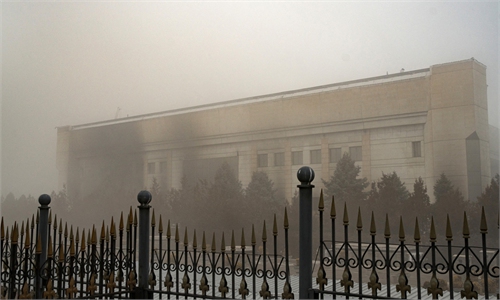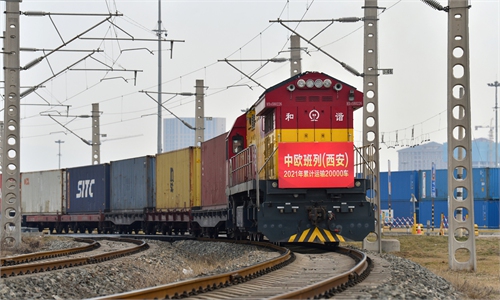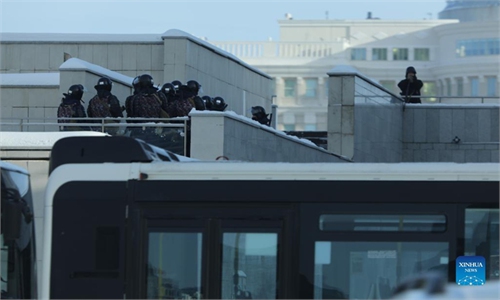Riot deescalates in Kazakhstan amid Russia-US wrangling
US smears Russian presence for fear of fading influence in Central Asia: expert
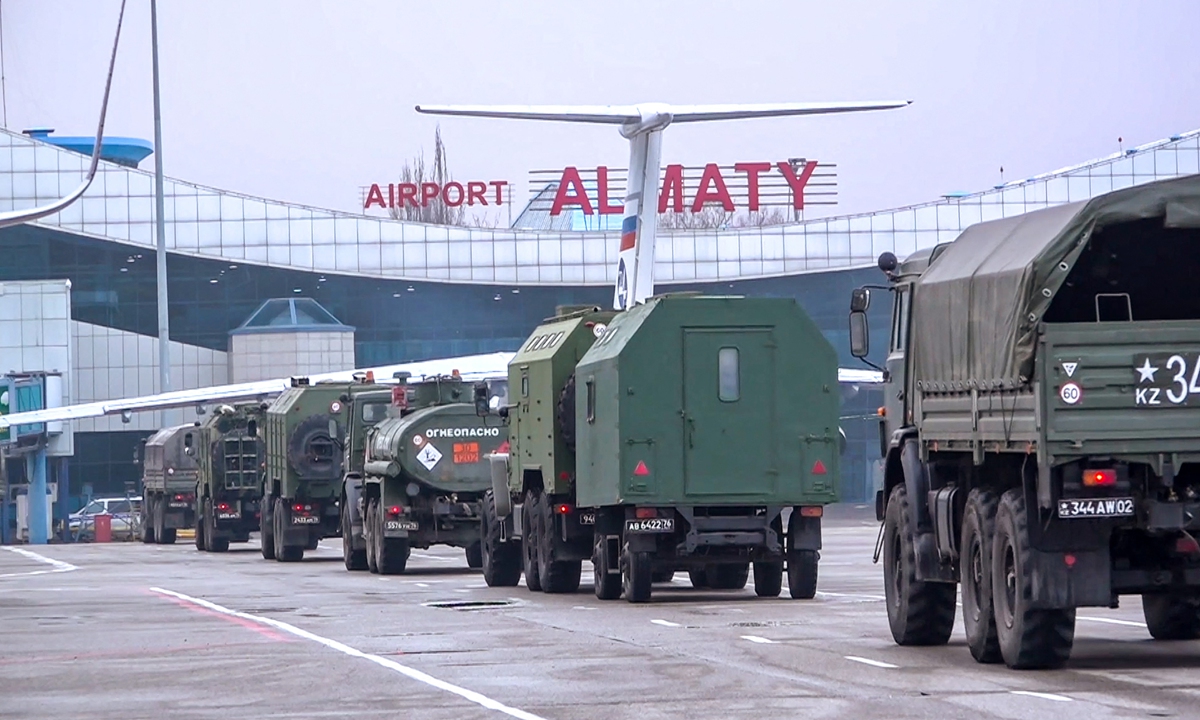
Russian military vehicles moving along an airfield after a military cargo plane landing in Almaty, Kazakhstan on January 9, 2022.
The situation in Kazakhstan is basically stabilized by Sunday with nearly 6,000 people, including the country's former intelligence chief, having been arrested by security forces during the days of violent anti-government protests. The world is pondering as to why Kazakhstan, a stabilizer in Central Asia, saw the deadliest internal struggle the former Soviet republic has seen in decades and when the chaos will end.Wrangling between Washington and Moscow is also intensifying after Russia, which extended great assistance to Kazakhstan to quell the turmoil, rebuked remarks by US Secretary of State Antony Blinken that Kazakhstan might have a hard time getting rid of Russian troops, saying that the US should reflect instead on its military meddling around the world.
Chinese experts predicted that the future relations between Russia and Kazakhstan will step up to a higher level, while the ties between the US and Kazakhstan, as well as other Central Asian countries, will inevitably decline following the crisis.
They said that noises attempting to drive a wedge between Russia and Kazakhstan are apparently an old tactic of the West, which has always been dedicated to wooing the Central Asia state. Such a tactic is ridiculous and shows they fear to see their influence fade in the region.
As Russia has already sent troops to Kazakhstan and helped control the security situation, the US could only exert some diplomatic pressure. Further US sanctions on Kazakhstan and Russia on the excuse of political interference can be expected, but will not have too much impact, experts said.
Blasting fuse
Residents in Kazakhstan took to the streets following a steep rise in fuel prices last week, but the protests quickly expanded to encompass economic and political grievances.
Kazakhstan authorities said on Sunday they had stabilized the situation and "a number of strategic facilities have been transferred under the protection of the united peacekeeping contingent of the Collective Security Treaty Organization (CSTO) member states," the presidential office said in a statement detailing the security briefing chaired by President Kassym-Jomart Tokayev.
Security and intelligence officials briefed Tokayev that they were continuing "clean-up" actions.
Chinese analysts on Central Asian affairs said the situation in Kazakhstan has been complex for a long time. It seems calm on the surface, but there are many unstable elements inside. The rise in fuel prices was just the blasting fuse.
In the 30 years since the disintegration of the Soviet Union, the top political leadership has largely remained unchanged in Kazakhstan, and there have been constant opposing voices inside the country, though it has been suppressed in one way or another, said Li Jianmin, academic dean of the Institute of Central Asian Studies at Northwest Normal University.
The huge gap between the rich and the poor, compounded by the COVID-19 pandemic, has made the situation worse. Given Kazakhstan's geopolitical peculiarities, it cannot be ruled out that outside forces have played a role in inciting disturbances or even color revolution, Li said.
A man who has been detained in Almaty has confessed that he'd arrived from Kyrgyzstan after unknown people offered him over $200 to take part in protests in neighboring Kazakhstan, Sputnik reported, citing Kazakh broadcaster Khabar 24.
Nearly 6,000 people have been arrested in Kazakhstan over the riots, including a number of foreigners, media reported.
The next step for Kazakhstan is to eradicate terrorists but it may still take time to restore public order, the expert said.
US still troublemaker
Leaders of the member states of the Collective Security Treaty Organization (CSTO) will meet soon to discuss the unrest in Kazakhstan, Russian President Vladimir Putin and his Kazakh counterpart Kassym-Jomart Tokayev said Saturday.
In a phone conversation, Tokayev informed Putin of the riots in Kazakhstan, noting that the situation is stabilizing. He thanked Kazakhstan's partners from the CSTO, particularly Russia, for their assistance. Putin and Tokayev exchanged opinions on the measures being taken to restore order in Kazakhstan.
"Since Russia supported the Kazakh government at a critical time, the country's cooperation with Russia will be further enhanced and the mutual trust on military and security will be upgraded to a higher level," Zhang Hong, an Eastern European studies expert from the Chinese Academy of Social Sciences, told the Global Times on Sunday.
It is obvious that the US will not wait to see Kazakhstan become part of the Russian sphere of influence as Kazakhstan is an important country in the heart of Asia and an energy producer, where the US has significant investments, Zhang said.
When the situation stabilizes, the US, the usual troublemaker, may impose sanctions on Kazakhstan or Russia on the allegation of Russia's interference in other countries, the expert said, noting that the military presence is also likely to be an excuse for the West to pressure Russia in the upcoming NATO Russia Council meeting and bilateral security talks between Russia and US in Geneva.
Criticizing the presence of Russian troops, Blinken said "one lesson of recent history is that once Russians are in your house, it's sometimes very difficult to get them to leave."
Russian foreign ministry responded with sharp words: "When Americans are in your house, it can be difficult to stay alive and not be robbed or raped."
The opposition force is urging the West to "enter the fray" and to prevent Russia from recreating "a structure like the Soviet Union," media reported.
Foreign Policy magazine said the potential for a revanchist Russia to use Kazakhstan's domestic turmoil as a pretext to seize a swath of northern Kazakhstan.
But according to the expert, gripping neighbors tightly is not Russia's national security strategy and sending troops to help Kazakhstan is for regional stability and peace, and the move is legal from the perspective of international law.
The West has been trying to bring Kazakhstan on board for a long time. Hyping the threat from Russia only shows their fears of further losing their influence in the region, Li said.
Li Yonghui, a senior research fellow at the Chinese Academy of Social Sciences, pointed out that although the US will not abandon its geopolitical struggle in Central Asia, it will not exert too much influence as its strategy the region is shrinking.
"The country can only infiltrate the region through its non-governmental organizations and is unlikely to confront Russia publicly," Li said.
Although China does not need and has no intention to act like the Collective Security Treaty Organization (CSTO) to deploy peacekeeping forces there, analysts said China could also offer support in the fields of economic cooperation and assistance, as well as counter-terrorism, to help neighboring Kazakhstan restore stability and realize effective reforms and long-term economic development.
"China cares about the safety of its nationals in Kazakhstan. It is also necessary for us to be vigilant on spillover of the unrest to impact the stability of border areas," Li said, noting that China is also able to provide counterterrorism support to Kazakhstan under the Shanghai Cooperation Organization framework.
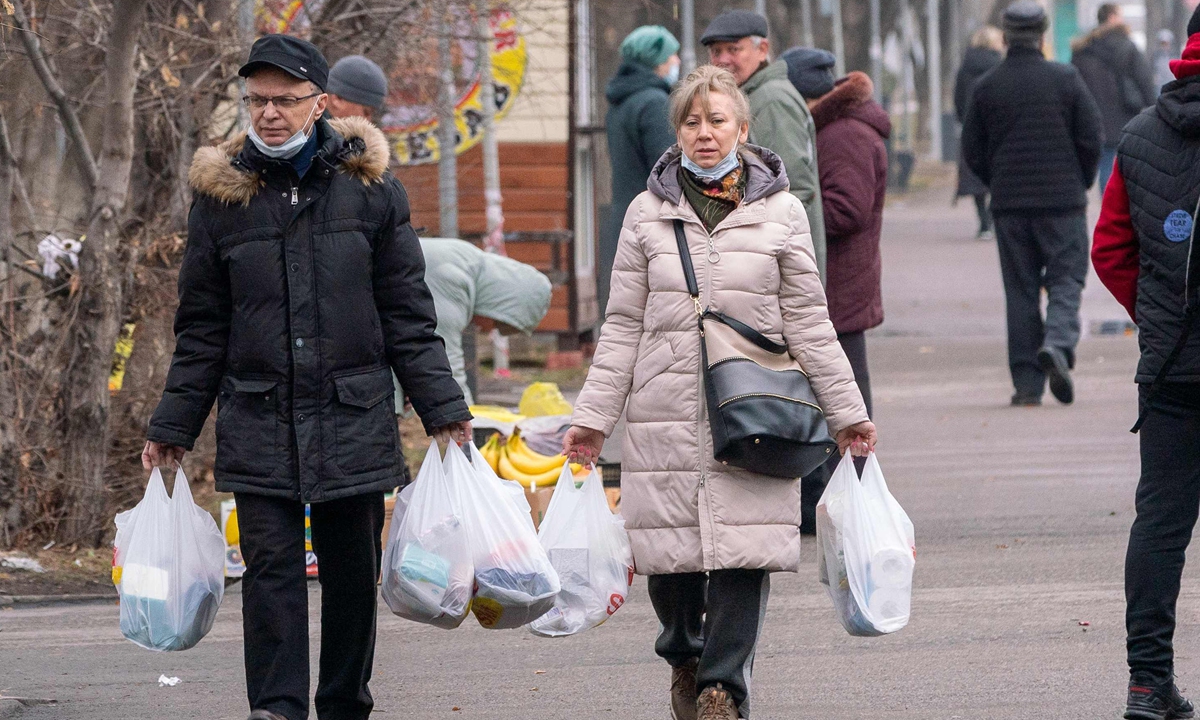
Pedestrians carry food in Almaty, Kazakhstan on January 9, 2022, after violence that erupted following protests over hikes in fuel prices. Phone signals resumed in the afternoon but mobile internet remains inaccessible. Nearly 6,000 people, including a number of foreigners, have been arrested in Kazakhstan over the riots. Photo: VCG

